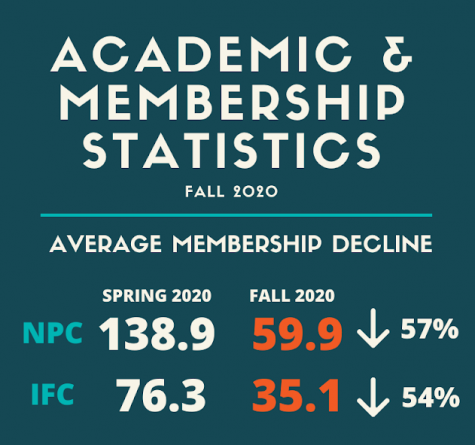In the wake of the Abolish Greek Life (AGL) movement and COVID-19, Greek life participation fell to record lows in Fall 2020, according to a bi-annual report released on Feb. 14 by the Office of Greek Life (OGL).
Membership among Vanderbilt’s ten Panhellenic chapters declined 57 percent between Spring 2020 and Fall 2020, with the average chapter size falling from 138.9 to 59.9 members. The OGL has published membership statistics, including average GPA and chapter size, each semester since Spring 2012. Fall 2020 is the Panhellenic’s lowest semester on record.
Interfraternity Council (IFC)’s average chapter size showed similar declines, with average chapter size falling to 35.1 individuals in Fall 2020, its lowest in at least eight years and a 54 percent decrease from Spring 2020. Fall 2016 had the closest tally to the recently released numbers, with an average chapter size of 54.6 individuals.
“The decrease in membership numbers reflected on the fall grade report was not unexpected,” Director of Greek Life Kristin Torrey said in an email on Feb. 19 to The Hustler. “There were a number of reasons for the decline, including the graduation of the Class of 2020, students resigning their memberships and members being inactive due to remote study.”
The OGL’s Fall 2020 report officially recognized ten fraternities: these included Alpha Tau Omega, Delta Kappa Epsilon, Delta Tau Delta, Kappa Alpha, Kappa Sigma, Lambda Chi Alpha, Pi Kappa Alpha, Sigma Chi, Sigma Nu and Zeta Beta Tau. The fall report omitted statistics for Delta Tau Delta which disbanded in July 2020.
Plans for IFC Expansion
Per the Fall 2020 report, IFC’s average chapter size fell to 35.1 individuals in Fall 2020, its lowest in at least eight years and a 54 percent decrease from Spring 2020.
According to current junior and IFC President John Blang, fall chapter sizes tend to be smaller than spring ones each year, since the past year’s graduating class has not been succeeded by new recruits.
“The class of 2020 seniors have graduated and had not yet been replaced by classes of new members at the time those numbers [in the Fall 2020 report] were recorded,” Blang said in an email to The Hustler. “This is a cyclical process of rising and falling numbers that happens every year.”

Fall 2020 showed lower chapter sizes compared to past fall semesters as well. During Fall 2016, the lowest semester on record before this one, IFC had an average chapter size of 54.6 individuals—more than one and a half times this fall’s numbers.
Per Blang, the loss of the Delta Tau Delta chapter and members who chose to go inactive during COVID-19 contributed to lower chapter sizes this fall.
In contrast, IFC recruitment this year saw the highest number of recruits in the past four years, per Blang. In Spring 2020 so far, 206 new members have accepted bids, compared to 189 in Spring 2019, Blang said.
“We made our focus on reform clear during recruitment, and only looked to bring in members who are interested in helping us continue to improve,” Blang said.
Per Blang, IFC plans to add a new IFC fraternity for nearly every semester through 2024. Alpha Epsilon Pi is recolonizing and taking a new member class this spring; Beta Theta Pi and Phi Delta Theta have confirmed return agreements with IFC and Vanderbilt for Fall 2021 and Spring 2022, respectively.
“We see a great potential for growth while working to ensure that these new chapters are aware of the requirement to be reform-minded as they form their brotherhoods,” Blang said.
Delta Tau Delta Officially Disbands
The Delta Tau Delta chapter, which dissolved in July 2020, was not included in the Fall 2020 report from the OGL.
Senior Philip Dowdell served as the fraternity’s last president during his junior year until last July. Per Dowdell, between 85 and 90 Delta Tau Delta members dropped over the summer, most around the time when 27 former members published a guest editorial explaining their decision to dissolve.
However, per Dowdell, the organization could not officially disband until the last three to four members dropped in Fall 2020.
“The national organization told us—it was great—that it’s an agreement between the national fraternity and Vanderbilt, not a decision that we could make as students,” Dowdell said. “They told us if we wanted to disband, everybody could drop.”

Dowdell attributed the general decline in IFC enrollment to a changed attitude on campus surrounding Greek life, especially following the AGL movement. That environment might persuade otherwise undecided first years not to rush, Dowdell said.
“A lot of negatives are much more prominent than they were a few years ago,” Dowdell said. “That probably weighs more on first years in that decision.”
Emma Pinto, a current senior and one of the organizers behind Vanderbilt’s AGL movement, said she hopes the decline in Greek life enrollment persists past this semester.
“Hopefully, the conversations that began this summer have continued and made people rethink their participation in Greek organizations,” Pinto said.
Though Greek chapters at other schools, including Dartmouth and Tufts, have successfully
disaffiliated from their national organizations, Vanderbilt Greek life rejected that possibility, Dowdell said, and he hasn’t seen much hope in the reform strategy IFC maintains.
“I’m not in on IFC meetings or specifically up to date on what every fraternity is doing, but from what I’ve seen, it doesn’t seem like their version of small reforms is doing anything that’s that meaningful,” Dowdell said.
Panhellenic Council
The OGL has yet to publish the Panhellenic Council’s statistics for new members joining chapters this spring. In previous years’ fall reports, new member statistics have been published. However, Panhellenic Council President Susan Hollenbeck stated in an email to The Hustler that new member statistics will be released in a few weeks, without providing a concrete end date.
“[The sorority chapters] are still engaged in recruitment efforts,” Hollenbeck said.
















